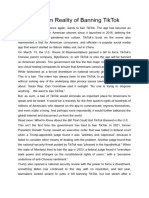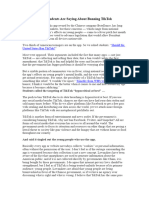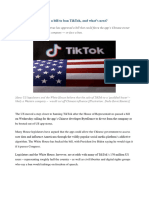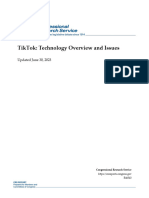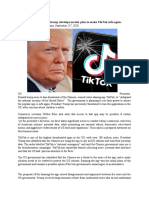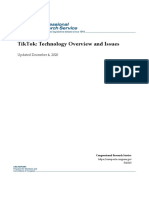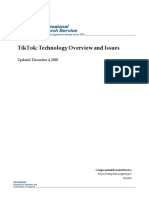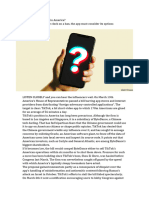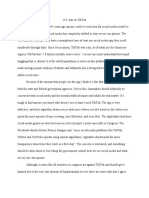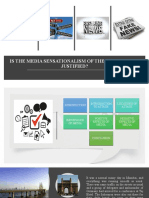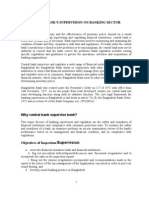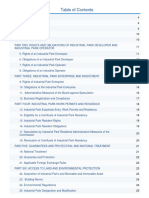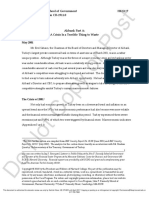Ryan Nunthapiwat
Professor Bridget Wagner
WRD 104
1
The Debate Over TikTok: National Security,
Free Speech, and Potential Solutions
TikTok has become the most popular social media platform in the United States, with over 170 million
Americans using TikTok which is just around half of Americans. 16.75% of TikTok's use comes from the
United States1. Based on that fact, it could be stated that TikTok is one of the most popular and most used
social media platforms in America. That being said, TikTok’s parent company, ByteDance Ltd., is a
Chinese operated company which owns TikTok's proprietary algorithm, which is developed and
maintained in China and is also responsible for developing portions of source code which runs the TikTok
platform. With that, some concerns with the United States govern with regard to the national security of
the country due to the current tension of China and the United States politically. Because of this, it has led
to a ban of TikTok for a short while, which happened towards the end of Joe Biden’s presidency. That
being said, the ban was uplifted after Trump took office, with Trump’s intentions providing time for
ByteDance to sell TikTok to an American parent company. That being said, with the popularity of TikTok
in the United States, free speech concerns come to light as a result of the ban talks. The potential TikTok
ban in the U.S. underscores the conflict between national security concerns due to its Chinese ownership
and the protection of free speech. Thus raising the question of to what extent is TikTok a threat to the
United States national security and free speech rights?
One of the main concerns that the United States government has is TikTok’s Chinese ownership through
ByteDance. The U.S government has expressed many fears that TikTok could be used as a tool for
potential espionage, because Chinese law requires ByteDance to provide user data to the Chinese
government upon request2. This raises concerns about potential surveillance, political manipulation, and
breaches of privacy. Therefore, as a result, the U.S Supreme court poised to uphold a law that bans
TikTok in the US over national security concerns unless its China based parent company sells the
platform to an American based parent company ahead of a deadline set on January 193.
Despite TikTok CEO Shou Zi Chew’s public statement that the Chinese Government has never requested
any sort of data from TikTok, and that TikTok would refuse any such request, U.S lawmakers still remain
unconvinced and skeptical. China has already shown signs of disapproval towards the proposed sale, with
some reports that China would rather see TikTok “die” in America than have ByteDance sell TikTok
away4. The ongoing negotiations between ByteDance and U.S officials highlights the complexities of
balancing national security with business interest and diplomatic relations. The argument for banning
TikTok also should take into account the potential use of the platform for political influence. Given its
algorithm driven content distribution, there are concerns that the Chinese government could manipulate
the algorithm and what content is shown to U.S. users, subtly shaping public opinion on political or social
1
Jamali, Lily, et al. "US Top Court Leans towards TikTok Ban over Security Concerns." www.BBC.Com, 10 Jan.
2025, www.bbc.com/news/articles/cz9g91gn5ddo. Accessed 14 Jan. 2025.
2
Cummings, Sean. “Possible U.S. TikTok Ban Has Science Communicators on Edge.” Science (American
Association for the Advancement of Science), vol. 383, no. 6689, 2024, pp. 1280–1280,
https://doi.org/10.1126/science.adp3270.
3
Jamali, Lily, et al. "US Top Court Leans towards TikTok Ban over Security Concerns." www.BBC.Com, 10 Jan.
2025, www.bbc.com/news/articles/cz9g91gn5ddo. Accessed 14 Jan. 2025.
4
Dwoskin, Elizabeth, et al. "China TikTok Sale Negotiations Trump." The Washington Post, WP Company, 5 Feb.
2025, www.washingtonpost.com/technology/2025/02/05/china-tiktok-sale-negotiations-trump/.
�Ryan Nunthapiwat
Professor Bridget Wagner
WRD 104
2
5
matters. TikTok played a huge in the 2024 presidential election , especially with the younger generations,
therefore this could showcase the potential influence China could pose, should they act on their laws.
Moreover, the users of Tiktok should also be taken into note, such as the viewers and the content creators.
Their main concerns have to do with the human right to free speech, expression, and opinion. The
potential ban would set a bad, unwanted precedent for censorship in the long term.
Beyond the national security concerns, TikTok’s potential ban raises crucial questions about U.S
residences freedom of speech. Numerous content creators, users and lawyers have expressed that banning
the app directly violates the First Amendment, which highlights the importance of free speech. Ergo,
banning TikTok would restrict the most popular platform that allows millions of users to express their
views and opinions, hence creating tension between the government and U.S residents. A ban could result
in a dangerous precedent being set for free speech in the digital age. If TikTok is banned due to national
security concerns, similar arguments could be made against other foreign-owned apps in the future. This
could raise broader concerns about censorship, government overreach, and the erosion of digital rights.
Content creators, with a great majority relying on TikTok as their primary source of income, could also
face financial problems if the platform is shut down, leading to job losses and economic disruption. Many
content creators already expressed their concerns about the ban on TikTok. The science community on
TikTok has expressed their concerns should a ban be placed. ByteDance’s app has provided a platform for
scientific and educational content6. It should be taken into account that scientist use of TikTok has helped
share knowledge, inspire young minds, and promote scientific curiosity7. It's important to note that it is
not only the science community who contribute towards innovation and education, but many different
communities. Many students and self learners actively turn to TikTok for quick, digestible lessons that
differ from traditional education. TikTok provides easy ways to share knowledge with one another,
allowing information to be spread quicker and more efficiently. That being said, should the platform be
banned, these educators and content creators would lose a significant approach to reach the public,
potentially interfering with innovation and education. Moreover, it would create a gap in easily accessible
education, making it harder for individuals to discover and engage with easy to follow, educational
videos. Removing this resource could have long term repercussions on digital literacy and knowledge
sharing, especially with the younger generations.
Additionally, TikTok is a huge contributor to the U.S economy. For example, TikTok contributed $24
billion in GDP while also providing 224,000 jobs in 20238, demonstrating its impact beyond just
entertainment. Therefore, a ban would create a significant gap in the U.S economy, at least in the short
term. Majority of content creators and small businesses rely on TikTok as a primary source of income,
with the help of its unique algorithm which allows entrepreneurs to reach a wide range of audiences. A
ban could severely disrupt these economic opportunities, particularly for younger generations who have
built careers through digital content creation.
5
Goldman, Jeremy. “TikTok becomes key battleground for Gen Z voters in 2024 election.” eMarketer, 24 October
2024, https://www.emarketer.com/content/tiktok-becomes-key-battleground-gen-z-voters-2024-election.
6
Cummings, Sean. “Possible U.S. TikTok Ban Has Science Communicators on Edge.” Science (American
Association for the Advancement of Science), vol. 383, no. 6689, 2024, pp. 1280–1280,
https://doi.org/10.1126/science.adp3270.
7
Remmel, Ariana. “US TikTok Ban: How the Looming Restriction Is Affecting Scientists on the App.” Nature
(London), 2024, https://doi.org/10.1038/d41586-024-01388-8.
8
Hale, Trenton. “A TikTok Ban Sets a Dangerous Precedent for Free Speech.” CE Think Tank Newswire,
ContentEngine LLC, a Florida limited liability company, 2024.
�Ryan Nunthapiwat
Professor Bridget Wagner
WRD 104
3
Given the complexity of the issue, potential solutions must balance national security concerns with the
right to free speech and the platform’s educational benefits. Recent developments in the ongoing issue
have complicated TikTok’s status in the U.S, as TikTok briefly shut down in January 2025 after the law
banning the app was placed, unless ByteDance sell’s its Chinese ownership. The app was then removed
from the playstore and the appstore, with its services suspended for those with the app already installed.
This move highlights the extent the U.S government took in order to respect national security concerns.
Trump proposed a potential compromise: a 50-50 joint venture between ByteDance and an American
owner, ensuring the U.S poses partial control while allowing TikTok to remain operating9 . This solution
aims to address fears of foreign influence while preserving the app’s economic and social benefits.
However, national security advocates remain concerned, emphasizing that any ongoing ties to China
present risks, including potential government access to user data or manipulation of content. Some U.S.
lawmakers insist that only a complete severance from ByteDance would ensure national security, while
others believe a carefully structured joint ownership model would offer a better compromise. The
evolving situation highlights the tension between government regulation, private business interests, and
public demand. With President electTrump’s intervention , TikTok has been granted temporary relief, but
the broader issue of national security concerns surrounding foreign owned technology companies remains
unresolved. Whether a sale or regulatory framework will ultimately secure TikTok’s future in the U.S.
remains an open question.
Trump’s intervention demonstrated another potential path forward, delaying enforcement of the ban while
negotiating a deal that meets national security requirements. The temporary halt on TikTok’s removal
allowed service providers like Apple and Google to restore access without fear of legal repercussions.
This suggests that phased regulatory measures or temporary extensions could be a viable solution to give
ByteDance and the U.S. government more time to negotiate an acceptable deal.
Some experts have proposed a legal framework in which TikTok operates under increased government
oversight without an outright ban. By implementing stringent data security agreements and requiring
periodic reviews of TikTok’s data handling practices, the U.S. could ensure compliance with national
security standards while avoiding the economic and cultural disruption a full ban would bring.
While the sale of TikTok remains a contentious issue, Trump’s executive order delaying the ban
underscores the possibility of an agreement that allows TikTok to function under U.S. regulatory
oversight. Whether this solution will be accepted by Congress and ByteDance remains uncertain, but it
highlights a compromise that preserves TikTok’s presence while addressing security concerns.
9
Duffy, Clare, and David Goldman. “TikTok is back online after Trump pledged to restore it.” CNN, 20 January
2025, https://www.cnn.com/2025/01/19/tech/tiktok-ban/index.html.
�Ryan Nunthapiwat
Professor Bridget Wagner
WRD 104
4








